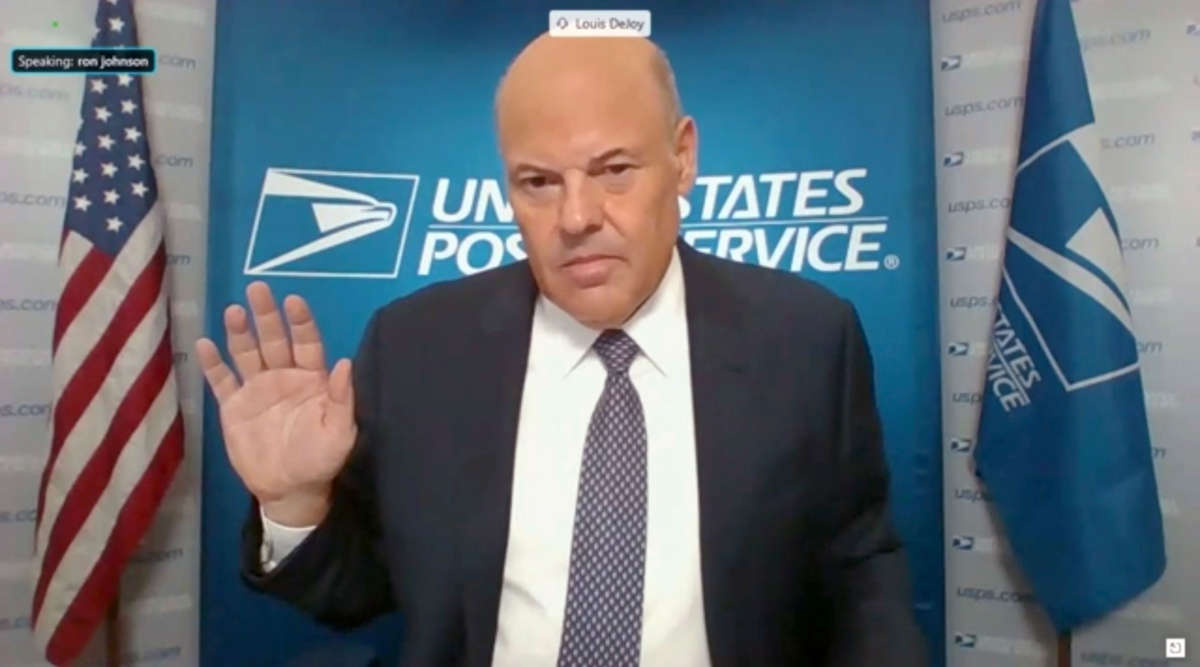Honest, paywall-free news is rare. Please support our boldly independent journalism with a donation of any size.
Postmaster General Louis DeJoy told the Senate Homeland Security and Governmental Affairs Committee on Friday that he has no plans to reinstate mail sorting machines in U.S. Postal Service (USPS) facilities, nor to replace public mailboxes that have been removed across the country.
Questioned by Sen. Gary Peters (D-Michigan) about whether the dozens of sorting machines that were removed from USPS facilities throughout the U.S., would be restored or not, DeJoy responded in the negative.
“There’s no intention to do that, they’re not needed,” DeJoy said in response to Peters’s question.
DeJoy also faced scrutiny for the removal of many publicly placed mailboxes across the country. When pressed on why USPS was removing the mailboxes, DeJoy claimed he had only learned about it after the fact.
“I was made aware when everyone else was made aware,” DeJoy said.
In spite of his claim to ignorance, DeJoy still defended their removal as a “normal process that’s been around 50 years.”
DeJoy also sought to assure lawmakers that mail-in ballots would be counted. “As we head into the election season, I want to assure this committee, and the American public, that the Postal Service is fully capable of delivering the nation’s election mail securely and on time,” DeJoy said.
But that contradicts what the USPS told 46 states last week, when it warned that the recent changes to sorting and delivering mail could result in some ballots not being delivered to officials on time to be counted in this year’s general election races.
News of plans not to reinstate sorting machines was also announced earlier this week. House Speaker Nancy Pelosi (D-California) wrote a series of tweets about her conversations with the postmaster general, noting that “he admitted he has no intention of replacing the sorting machines.”
While DeJoy suggested on Friday that mail sorting machines weren’t needed, despite their ability to organize as much as 36,000 pieces of mail per hour, postal workers have expressed differing opinions, with one clerk in Iowa describing how mail was “beginning to pile up in our offices” as machines were being removed.
DeJoy, who is a major donor to President Trump and the Republican party, had begun a series of so-called “reforms” to the USPS this summer, which included fewer work hours, changes to mail delivery and the removal of mail sorting machines. The reforms were suspended after mounting outrage of delays in mail delivery and threats of lawsuits from 20 states’ attorneys generals.
A number of critics have warned DeJoy’s moves were not simple cost-reduction reforms for the USPS but rather intentional attempts to disrupt mail-in voting or make Americans unsure of its effectiveness.
The severe disruption to mail service, coupled by Trump’s clear opposition to mail-in voting, prompted former President Barack Obama to weigh in on the matter.
“What are Republicans doing where you are so scared of people voting that you are now willing to undermine what is part of the basic infrastructure of American life?” Obama said during a podcast hosted by his former campaign manager David Plouffe.
In addition to the potential electoral and democratic fallout that may result from changes to the USPS, delays in mail delivery have already resulted in disastrous outcomes for many who depend on the Post Office.
Several individuals have reported that their prescriptions, bills, packages and other items have faced severe delays, with some veterans reported having waited more than two weeks longer than typical for the delivery of their medications.
A terrifying moment. We appeal for your support.
In the last weeks, we have witnessed an authoritarian assault on communities in Minnesota and across the nation.
The need for truthful, grassroots reporting is urgent at this cataclysmic historical moment. Yet, Trump-aligned billionaires and other allies have taken over many legacy media outlets — the culmination of a decades-long campaign to place control of the narrative into the hands of the political right.
We refuse to let Trump’s blatant propaganda machine go unchecked. Untethered to corporate ownership or advertisers, Truthout remains fearless in our reporting and our determination to use journalism as a tool for justice.
But we need your help just to fund our basic expenses. Over 80 percent of Truthout’s funding comes from small individual donations from our community of readers, and over a third of our total budget is supported by recurring monthly donors.
Truthout has launched a fundraiser, and we have a goal to add 231 new monthly donors in the next 48 hours. Whether you can make a small monthly donation or a larger one-time gift, Truthout only works with your support.
